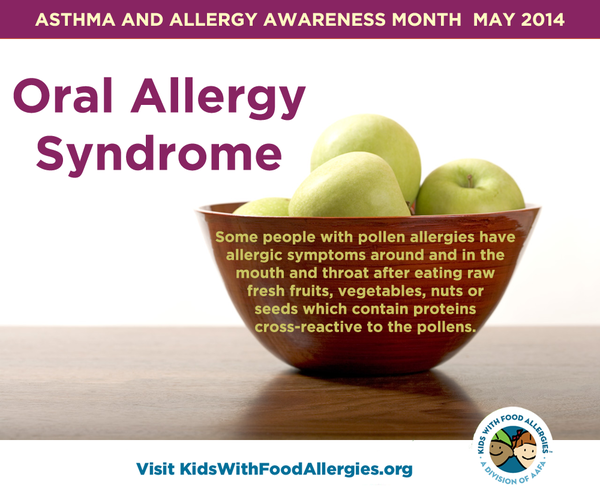Do you or your child get an itchy mouth after eating fresh fruits? Dr. Vaishali Mankad explains oral allergy syndrome, food allergy and pollen allergy cross-reactivity:
CROSS-REACTIVITY BETWEEN POLLEN AND FOODS
(POLLEN-FOOD SYNDROME OR ORAL ALLERGY SYNDROME)
Some individuals with pollen allergies (allergic rhinitis or hay fever) can develop symptoms around and in the mouth and throat immediately after eating raw fresh fruits, vegetables, nuts or seeds which contain proteins cross-reactive to the pollens. This is known as oral allergy syndrome or pollen-food syndrome. For example, people with birch pollen allergy may experience symptoms after eating raw apples, peaches, pitted fruits, carrot and hazelnut among others. Likewise, Ragweed allergic individuals experience symptoms with melons among other foods. Symptoms can include itching or tingling of the lips, tongue, and roof of the mouth or throat. In addition there may be hives around the mouth area where the food came into contact with the skin or swelling of the lips, tongue, and throat tightness. In less than 3%, symptoms may become systemic (beyond the mouth or throat) or result in anaphylaxis. Cooked forms of the foods are usually tolerated because the food proteins which are pollen cross-reactive are fragile and are broken down when subjected to heat or stomach acids (so, for example, raw apples can cause symptoms but an apple pie can be eaten without any symptoms). Not all people with pollen allergies have oral allergy syndrome (OAS), but many do. And, for those who do have oral allergy syndrome, they may experience symptoms with some but not all foods cross-reactive to a particular pollen to which they are allergic.
FOOD ALLERGIES AND CROSS-REACTIVITY



Comments (4)